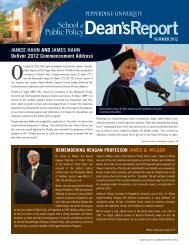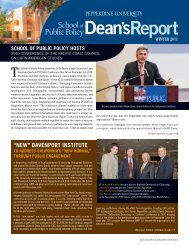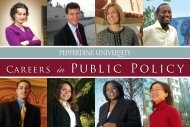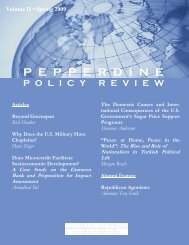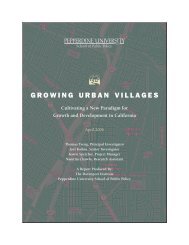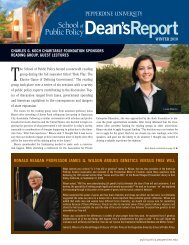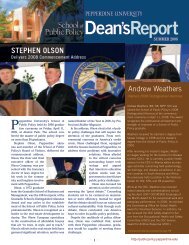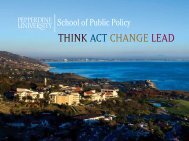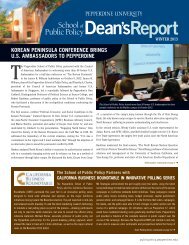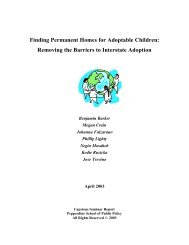Pepperdine University School of Public Policy
Pepperdine University School of Public Policy
Pepperdine University School of Public Policy
You also want an ePaper? Increase the reach of your titles
YUMPU automatically turns print PDFs into web optimized ePapers that Google loves.
Educating Citizens:<br />
Have We Kept the Founders’ Ideals<br />
for Higher Education?<br />
By HANS ZEIGER<br />
Engraved above the colonnade <strong>of</strong> the Angell Building at the <strong>University</strong> <strong>of</strong> Michigan<br />
are the words <strong>of</strong> the Northwest Ordinance <strong>of</strong> 1787: “Religion, morality, and knowledge,<br />
being necessary to good government and the happiness <strong>of</strong> mankind, schools and the means <strong>of</strong><br />
education shall forever be encouraged” (Northwest Ordinance). The irony <strong>of</strong> this inscription is<br />
that religion and traditional morality are not highly regarded at the <strong>University</strong> <strong>of</strong> Michigan.<br />
The <strong>University</strong> <strong>of</strong> Michigan was one <strong>of</strong> the major outposts in the campus wars <strong>of</strong> the 1960s, the<br />
legacy <strong>of</strong> which is a campus culture <strong>of</strong> multiculturalism, sexual obsession, and political correctness.<br />
Not even knowledge is prevalent in the postmodern university, if by knowledge we mean<br />
an integration <strong>of</strong> the disciplines into a coherent reality. Instead, we witness a fragmented<br />
world <strong>of</strong> deconstruction and trivial pursuits where the black perspective, the gay perspective,<br />
or the female perspective takes the place <strong>of</strong> a single reality. Each perspective is weighted by a<br />
political agenda (typically to the left), and pr<strong>of</strong>essors, many <strong>of</strong> them having come <strong>of</strong> age with<br />
the protests <strong>of</strong> the 1960s, unload politics into the classroom. 1 Though higher education is more<br />
politicized than ever, it is doing little to prepare students for responsible engagement in politics.<br />
Since there is no shared philosophy about “religion, morality, and knowledge,” we may ask<br />
whether “good government” is still possible.<br />
Indeed, in a republic, civic duty begins with education. “In the United States, the sum<br />
<strong>of</strong> men’s education is directed toward politics,” Alexis de Tocqueville observed in Democracy in<br />
America (292). Such a statement would have thrilled many <strong>of</strong> the founders, who hoped that<br />
educational institutions, especially at the university level, would be aimed toward the cultivation<br />
<strong>of</strong> republican civic duty. In their rhetoric about higher education, the founders were careful<br />
to shape the discussion around the political demands <strong>of</strong> the new republic. This article will<br />
demonstrate that the founders cared deeply about higher education as the means to prepare<br />
the rising generation <strong>of</strong> American leaders. We may analyze today’s university in light <strong>of</strong> the<br />
founders’ ideal.<br />
Institutional education in the early agrarian republic was not widespread, and college<br />
education was rare. Before the revolution, the colonies could boast but nine colleges, all <strong>of</strong><br />
them small and some unstable (Rudoph, Essays on Education xvii). In the colonial setting,<br />
higher education was directed mainly toward the training <strong>of</strong> ministers and Christian gentlemen<br />
(Pangle, 146).<br />
1 Some readings on this topic include Allan Bloom’s Closing <strong>of</strong> the American Mind (New York: Simon and Schuster,<br />
1988), Martin Anderson’s Impostors in the Temple: A Blueprint for Improving Higher Education in America<br />
(Stanford, CA: Hoover Institution Press, 1996), Alan Charles Kors and Harvey A. Silverglate’s The Shadow <strong>University</strong>:<br />
The Betrayal <strong>of</strong> Liberty on America’s Campuses, and Roger Kimball’s Tenured Radicals (New York:<br />
Harper and Row, 1990). Challenging many <strong>of</strong> these arguments is John K. Wilson’s The Myth <strong>of</strong> Political Correctness:<br />
The Conservative Attack on Higher Education (Durham, NC: Duke <strong>University</strong> Press, 1995).<br />
11



